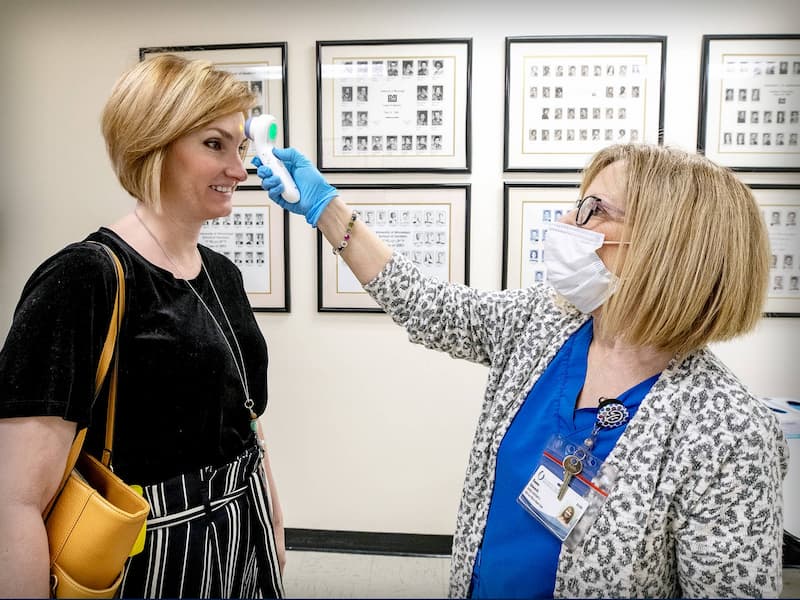As reported COVID-19 cases increase, UMMC stands ready for action

The Mississippi onset of COVID-19, the disease caused by the novel coronavirus that has been declared a global pandemic, means life as we knew it a couple of months ago has now changed indefinitely.
The University of Mississippi Medical Center, the state’s only academic health sciences center, is highly prepared for the health challenges of COVID-19 and is working around the clock to ensure proper care for those in need of screening, isolation and treatment. Although no one with a confirmed case of COVID-19 was a patient at the Medical Center as of March 16, the progression of the disease in communities nationwide and globally is rapidly changing.
On March 11, the Mississippi State Department of Health (MSDH) reported the state’s first positive case of COVID-19, a Forrest County man who recently traveled to Florida. The patient voluntarily isolated himself at home to prevent further transmission to others and wasn’t hospitalized.
Eleven more cases have since been identified as of March 16, among them a Forrest County woman over 65 who recently traveled to North Carolina and was hospitalized; a Forrest County man who recently traveled to Florida, and who is home self-isolating and didn’t require hospitalization; a Leflore County woman who is home self-isolating and didn’t require hospitalization; a Pearl River woman over 65 who was hospitalized; and a Copiah County woman over 65 who was hospitalized.
MSDH reported four of those cases on March 15 and two more March 16 Overall, the 12 cases include three in Forrest County, three in Pearl River County, two in Hinds County, two in Copiah County, one in Leflore County, and one in Monroe County.
The Hinds County cases are two students, one at Jackson State University and one at UMMC. Both are self-isolating at home, and the UMMC student did not return to campus after the student’s diagnosis during spring break.
MSDH is investigating all cases to limit spread of the virus.
Not just the specter of being infected by the virus, but adapting to ramped-up infection control, cancellation of favorite events, and taking part in “social isolation” is the new norm. Gov. Tate Reeves has declared a state of emergency and urged K-12 schools to stay closed through March 20 and people to work from home if possible.
UMMC’s Infection Prevention experts, doctors, nurses and clinical staff have taken measures to protect employees, students, patients and families – but Mississippians, especially those over 60 who are most at risk, must take personal steps to stay healthy.
The Medical Center is partnering with MSDH and the U.S. Centers for Disease Control and Prevention to bring the most up-to-date information to the Medical Center family and Mississippi communities so that everyone can make their best decisions on prevention and continue making necessary changes to their day-to-day lifestyles.
UMMC Chief Administrative Officer Dr. Jonathan Wilson is operational leader for all Medical Center activities related to COVID-19. Dr. Alan Jones, chair of Emergency Medicine, will lead a clinical coordination team that will assist Wilson with hospital and ambulatory preparations and responses. Joining Jones as team members are Dr. Javed Butler, Medicine; Dr. Mary Taylor, Pediatrics; and Dr. Chris Anderson, Surgery.
From day one, our COVID-19 medical leaders have been Dr. Jason Parham, chief of the Division of Infectious Diseases, and Dr. Bhagyashri Navalkele, medical director for Infection Prevention. Our Disaster Response Team also will continue to play an active role.
Some helpful links:
Keep up with the Medical Center’s preparations and protocols for suspected and confirmed COVID-19 cases here.
Information from the MSDH on the public health aspects of COVID-19, an up-to-date count and location of confirmed cases, and recommendations on keeping safe can be found here.
Find out the CDC’s plans to mitigate COVID-19 and recommendations on keeping workplaces, homes, schools and businesses safe here.
Go here to keep up with the global and national COVID-19 numbers and progression.
Check key facts about COVID-19 and help stop the spread of rumors here.
Here are some highlights of what Mississippians need to know for the weeks ahead:
Diagnosis of COVID-19
Guidelines from the U.S. Centers for Disease Control and Prevention on who should be screened are changing and may continue to change.
Screenings will take place on someone experiencing fever and signs/symptoms of lower respiratory illness (cough, shortness of breath), and, in the last 14 days before symptoms appeared, had either a history of travel from any of five geographical areas outside the United States: China, Japan, South Korea, Italy and Iran; or close contact with a laboratory-confirmed COVID-19 patient.
In addition, given the increased evidence of community spread within the United States, CDC updated its guidelines to say a physician's suspicion of COVID-19 is sufficient indication for testing what appears to be a milder case not requiring hospitalization. They will base this on the local outbreak situation and evaluation of those with severe respiratory illness of unclear origin.

“Most acute care hospitals in the state are prepared to receive COVID-19 patients, including screening, isolation and care as needed,” Wilson said. “Unlike the Ebola crisis of a few years ago, COVID-19 patients do not receive added benefit from a higher level of care offered by tertiary medical centers, meaning those that treat more severe conditions requiring specialized knowledge and more intensive health monitoring.”

“If you believe that you could have COVID-19 based on your symptoms, you can be screened and give samples for testing by going to an urgent care clinic or your physician’s office,” said Dr. Bhagyashri Navalkele, assistant professor in UMMC’s Division of Infectious Diseases and medical director of Infection Prevention. “However, you are asked to call ahead of your arrival to give staff time to take steps to protect patients and employees from possible exposure.
“It is not necessary to go to UMMC’s Emergency Department, or any Mississippi hospital ER, unless you are having a true emergency, such as difficulty breathing,” Navalkele said. “It’s important to keep emergency rooms available for critical care of those who aren’t possible COVID-19 patients.”
All Medical Center faculty, staff and students should stay home and notify their immediate supervisors or instructors if they are experiencing fever, cough or shortness of breath. If symptoms become severe, they are encouraged to see their regular medical provider.
For the most recent CDC guidelines on screening, click here.
Who provides testing for COVID-19 and how
The Mississippi State Department of Health is providing most testing for Mississippians, and the Medical Center is evaluating the possibility of on-site testing. MSDH uses special test kits to examine bodily specimens submitted by health care professions from hospitals and clinics to determine if a person is positive, and they send the testing materials to the CDC for a second check.
The test can rule out COVID-19 in patients who might instead have flu, a different coronavirus, or a bad cold with symptoms that can mimic COVID-19.
Physicians can now submit specimens to MSDH or a private commercial lab without first consulting MSDH staff. That will streamline necessary testing. You and your health care provider can discuss whether testing is appropriate in your situation based on your symptoms and likelihood of contact with someone who has the disease.
Call the MSDH COVID-19 hotline to ask questions about testing at (877) 978-6453, Monday-Friday from 8 a.m.-5 p.m.
Difference between COVID-19 and the flu or a cold
The CDC advises people consider these sets of symptoms in evaluating what illness they might have. Itchy eyes, stuffy nose and sneezing are symptoms of a cold or allergies. Fever, fatigue, body aches, cough and worsening symptoms can be the flu or COVID-19. Adding shortness of breath, a travel history and exposure to someone with COVID-19 could mean you have COVID-19.
However, symptoms and risks vary from person to person, so always check with your doctor.
Learn more about how and why COVID-19 differs from the flu and the common cold from former CDC Director Dr. Tom Frieden here.
Protecting yourself from COVID-19
Many of the same common-sense precautions against seasonal influenza should be followed for COVID-19.
COVID-19 is spread by droplets created by coughing or sneezing, the same way the flu is spread. Someone can inhale the droplets and be infected, or touch their eyes, nose or mouth with fingers that have been exposed to droplets. Spread can also occur from touching a contaminated surface and introducing the virus into your nose, eyes or mouth.
It’s considered highly contagious, although how easily a virus spreads person to person can vary. The CDC offers constantly updating information about the disease here as it becomes available in a rapidly evolving situation.
“First and foremost, wash your hands properly and often – with soap and water for at least 20 seconds,” Navalkele said. “Find the best and most effective technique here. If that’s not available, use an alcohol-based hand sanitizer. Avoid touching your eyes, nose and mouth with unwashed hands; learn how to best sanitize your work area or household here.”
Avoid close contact with a sick person, especially those coughing or sneezing. Close contact with a sick person is the most common mode of transmission of viral illnesses, including COVID-19. In view of widespread cases in the world and across some states, adapt some no-touch greeting methods, such as a fist bump, elbow bump, nod/wave, or a smile.
Refrain from going into the public if you’re sick, whether or not you have a confirmed COVID-19 case. Cover your cough or sneeze with a tissue, then throw the tissue in the trash. Clean and disinfect frequently touched objects and surfaces.
Immunization from the flu won’t prevent COVID-19 or lessen its effects, but a flu vaccination can prevent the flu during a busy season or make it less severe. It can decrease your chance of hospitalization and death. It also keeps you healthier and better able to fight off other infections.
Should I wear a mask, gloves or other protection in public?
“If you are well, you don’t need to wear personal protective equipment, or PPE,” Wilson said. “The national shortage of medical supplies and PPE continues because some of those who don’t need protection are buying it up or taking it, potentially leaving front-line hospital caregivers and patients without. They are the only ones who need to wear gear designed to block droplets released into the air by someone who coughs or sneezes.”
The Medical Center has adequate medical supplies for use in an outbreak, but UMMC has taken steps to discourage employees, patients and patient families from taking PPE home with them so that enough will be on hand for those who need it.
Find out more about how COVID-19 spreads in public places and how to protect yourself here.
Social isolation and mass gatherings
The Medical Center has canceled any events that would have generated 100 or more participants, and organizers of a number of other events with fewer attendees have either canceled or postponed them.
The CDC on Sunday recommended the cancellation or postponement of events with 50 people or more for the next eight weeks in an effort to reduce COVID-19 transmission.
Experts recommend all Mississippians avoid gatherings such as concerts, festivals, conferences and other events attracting a crowd, especially if there is evidence of transmission in your county or adjacent People at high risk for serious illness from COVID-19 are older adults, the very young, and those with a chronic illness such as heart disease, diabetes, or lung disease. The CDC offers tips for avoiding infection in large gatherings here.
School and university closings
Several UMMC schools have announced changes to their schedules, and all student clinical rotations have been suspended through March 29.School-specific information is being sent directly to associated faculty and students.
The University of Mississippi and the state’s other public universities are extending their spring break through the week of March 16-20, and then conducting classes online instead of on campus until further notice.


